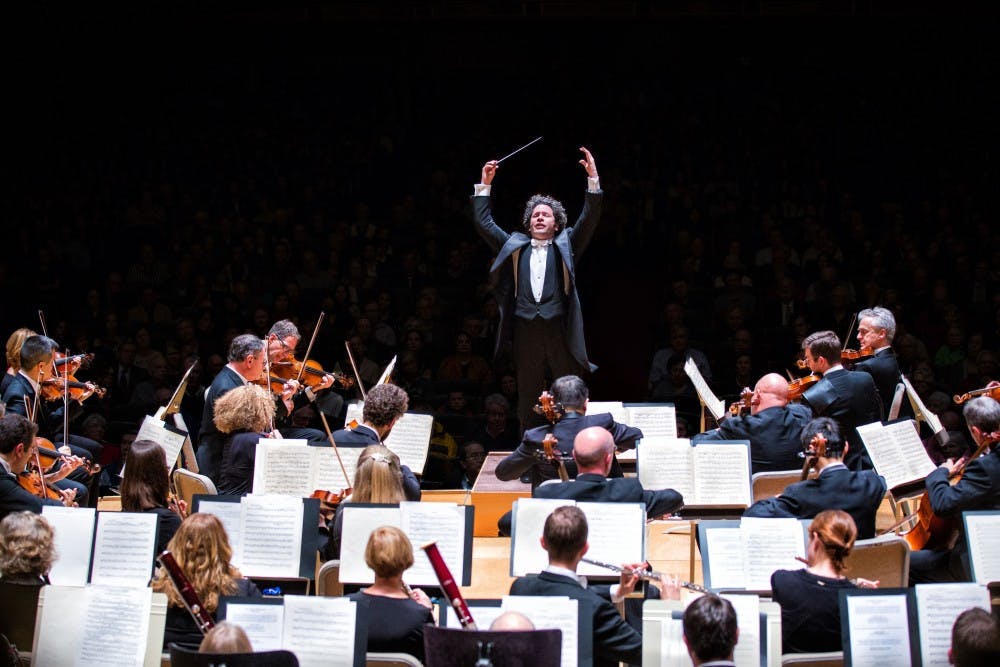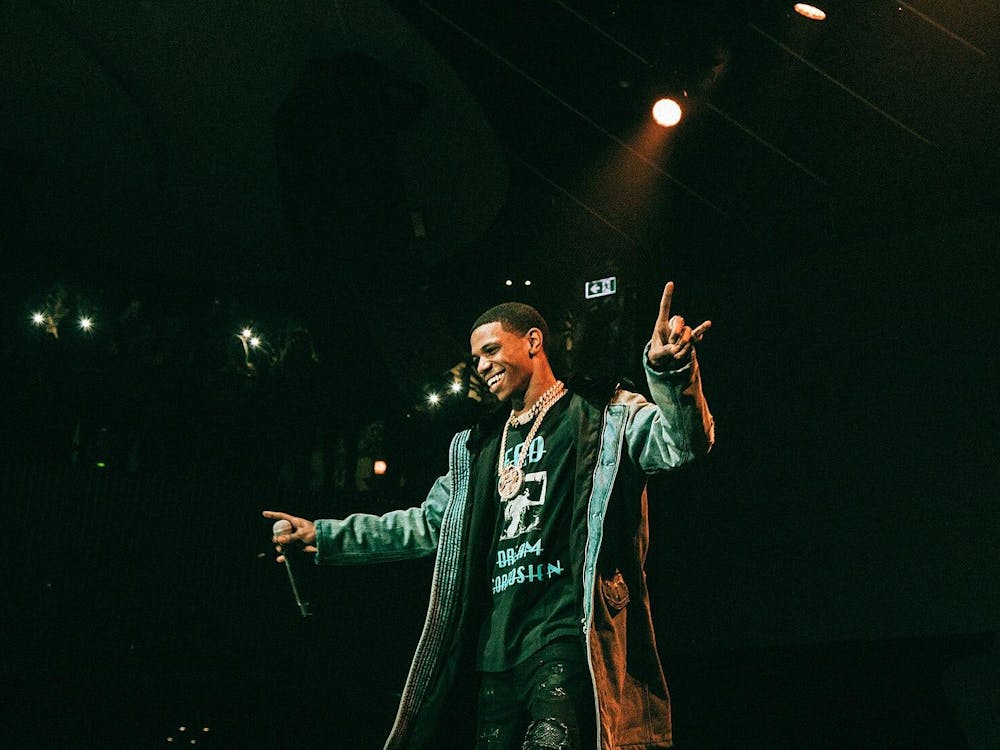When Maestro Gustavo Dudamel’s residency was announced in April 2018, most people thought it was an April Fool’s joke, according to Yang Song ’20, clarinetist and co-president of the Princeton University Orchestra (PUO).
“No one imagined that someone like Gustavo Dudamel would actually come to Princeton,” Song said.
Dudamel is Princeton University Concerts’ first-ever Artist-in-Residence. Marna Seltzer, Director of Princeton University Concerts, helped bring him to the University in celebration of the 125th season of Princeton’s concert series.
Currently in his 19th year as Music Director of the Simón Bolívar Symphony Orchestra of Venezuela, Dudamel has also been the Music and Artistic Director of the Los Angeles Philharmonic (LA Phil) since 2009. In addition to being awarded a Grammy for Best Orchestral Performance in 2012, he has received the Leonard Bernstein Lifetime Achievement Award for the Elevation of Music in Society in 2014 and the Americas Society Cultural Achievement Award in 2016. Dudamel has also worked alongside pop icons such as Beyoncé, Chris Martin, and Bruno Mars.
Throughout the 2018–19 season, Dudamel curated a concert exploring “Art & Faith,” which featured musicians from the LA Phil in early January. He also spoke with Spanish and Portuguese Professor Javier Guerrero in a Spanish-language talk entitled “La Música Como Libertad: Gustavo Dudamel en Princeton” (“Music as Freedom”).
He will conclude his tenure this weekend with two concerts leading the Princeton University Orchestra and Glee Club.
PUO Conductor Michael Pratt told The Daily Princetonian that Dudamel’s residency “brings a lot of national attention to the musical community at Princeton, the Music Department, and PU Concerts.”
While conducting University students and working with schoolchildren from underserved districts across the state, Dudamel has brought the experience of collaborating with top international orchestras and opera companies in hundreds of concerts.
“That vast background, plus his youth, charm, energy, and great musical instincts make him quite an inspiring musician,” Pratt said.
Timpanist and PUO webmaster Reilly Bova ’20 described playing for the legendary conductor with a trampoline analogy, comparing jumping out of sync with a friend to jumping in sync.
“When you bounce in-phase with your friend, the resonance will propel you upward and you will soar like an eagle,” Bova said.
That, he says, is what it feels like to play in an orchestra conducted by Dudamel.

“When he shapes phrases from the podium, it really does feel like he is physically interacting with the sound,” Bova said.
Lou Chen ’19, founder of Trenton Youth Orchestra (TYO), participated in a panel discussion with Dudamel and Anne Fitzgibbon GS ’98, the founder and executive director of the Harmony Program, about “El Sistema,” a publicly financed music education program for underserved children to which Dudamel traces his own musical origins. El Sistema was founded in Venezuela in 1975 and now serves 700,000 students around the world.
Chen gave Dudamel and his wife a private tour of campus in December, which concluded with a performance of music from “Harry Potter” by the TYO. The youth orchestra is composed of students from Trenton and is run by University student volunteers who help coach individuals, enrich their musicianship, and cultivate an understanding of collaborative performance.
After the performance, Chen recalled Dudamel saying, “That was beautiful. I could imagine the owls flying down from the ceiling!”
That moment was particularly profound for Chen and his students.
“That was their music he was talking about — not music performed by the LA Phil or PUO, but by a group of children who had been playing their instruments for only a few years,” Chen said. “It was one of those moments that will stay with them — and with me — for the rest of our lives.”
Chen described how he believed Dudamel was living proof of the importance of TYO's mission, which is to give every child the opportunity to fall in love with music.
“By interacting with so many of these children during his residency — whether it's members of various El Sistema programs across the country, or students from Trenton right next door — he's reminded them of their potential as musicians, as well as their responsibility to uplift future generations through music,” Chen said.
According to students, music is more than just a tradition to Dudamel; to him, music builds community, and it is the duty of musicians and conductors alike to inspire communities and serve as role models for the music students of tomorrow.
Students in PUO say that playing under the baton of Dudamel is a visceral experience, offering musical insights and highlighting nuances they may have never noticed on their own.
Song told the ‘Prince’ that this experience allowed him to stretch his capabilities and perform at the highest level.
“For an individual musician, there is nothing greater than performing in a concert conducted by the legendary Gustavo Dudamel,” he said.
In one of the rehearsals, Gustavo Dudamel solfèged the entire flute solo of the Mendelssohn scherzo — that is, he sung all of the notes using the “Do-Re-Mi” scale without looking at the score.
“The entire orchestra was absolutely stunned,” Song recalled, adding, “no one could imagine someone being able to solfège the entire part with such brilliant speed and dexterity.”
An anonymous submission posted on the Tiger Confessions page read, “Yeah Eminem can rap fast, but have you heard Gustavo Dudamel solfège Mendelssohn?”
Students said they felt inspired by Dudamel to bring more musical opportunities to local youth, both locally and around the world.
“I hope that we not only embody the Dudamel spirit in all our musical endeavors,” Chen said, “but also seek to imbue that same spirit in as many aspiring young musicians as possible.”
“Dudamel has the unique talent and ability to unite people of all different backgrounds through music,” Song added. “His incredible energy is infectious within the entire orchestra, and every time we rehearse with him, we feel new life — just like being reborn. He has so much energy, and you can feel the energy radiating through all the players.”
Chen echoed this sentiment, saying, “He unearths the wondrous quality that exists in every piece of music and holds it up for all of us to see, [...] unlocking within us musical insights and abilities that we never knew we possessed.”
Dudamel’s meticulous attention to detail was on full display at Thursday's rehearsal, often drawing laughter from the audience as he labored over the smallest of imperfections. Musicians and community members present said they could tell he not only understood the music on an extremely deep and personal level, but was also able to communicate and teach his interpretations through his words and movements.
Dudamel told the orchestra that the hardest part of a note to play is the end. Alternating his attention between the singers and the string orchestra, Dudamel implored the latter to be more sensitive to the ends of their notes and instructed both groups to feel a crescendo not merely as an increase in volume, but rather as an “increase in the tension of the note.”
Even so, Bova said Dudamel never criticizes the musicians he works with, unlike typical conductors in the 19th and 20th centuries. According to Bova, Dudamel's philosophy of leadership galvanizes the musicians, as he “works through the raw inspiration he begets within the orchestra.”
When Maestro Michael Pratt began conducting PUO 41 years ago, the performing arts at Princeton were somewhat of an afterthought among both faculty and students.
Bova described how, over the past four decades, and with support from the University administration, Pratt has built the performance wing of the music department into what it is today — second to none within the Ivy league.
“Dudamel's residency, in celebration of the 125th anniversary of Princeton University Concerts, is the direct result of this transformation,” he explained, “and it serves to signal to the world that Princeton University is as great a hub for the arts as it is for academics and scholarship.”
Reflecting on Dudamel's residency, Bova said that this experience not only changed his life, but everyone else's as well.
“We are all better musicians because of this residency, and working with Maestro Dudamel will be a memory that we will all share for the rest of our lives,” he said.
Earlier this week, Dudamel held a community jam session with members of the Berlin Philharmonic and curated a program for members of Ensemble Berlin celebrating the intersection of music and nature. An original composition by Music Professor Steven Mackey was also premiered. Dudamel appeared on a panel with Nobel-winning physicist Kip Thorne ’65 at that concert and spoke to Irish intellectual Fintan O’Toole on Thursday in a conversation entitled “The Artist in Society.”
Dudamel’s sold-out final two concerts as Artist-in-Residence will take place on Friday, April 26, and Saturday, April 27, at 7:30 p.m. and 4 p.m., respectively. He will conduct PUO and Glee Club at Richardson Auditorium on Friday and at the Patriots Theater at the War Memorial in Trenton, N.J. on Saturday. Both concerts will feature Schubert’s Gesang der Geister über den Wassern D. 714, Tchaikovsky’s Romeo and Juliet, and Mendelssohn’s A Midsummer Night’s Dream, Op. 61.








